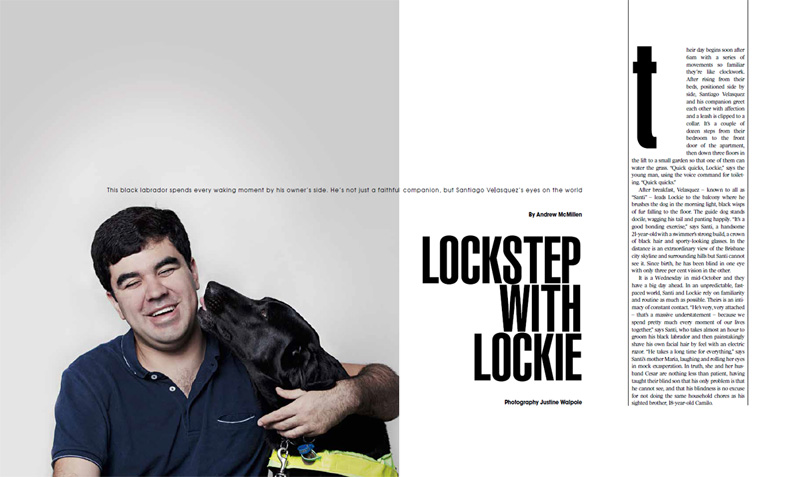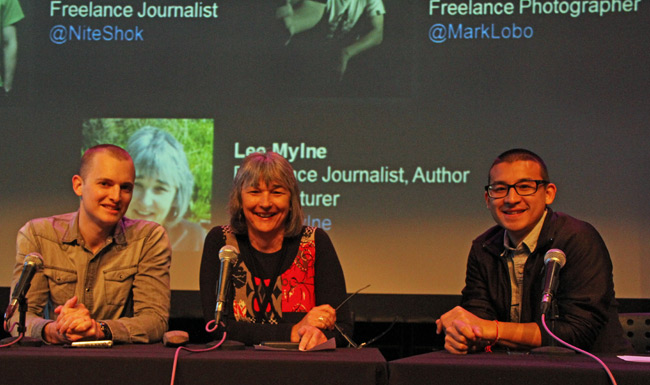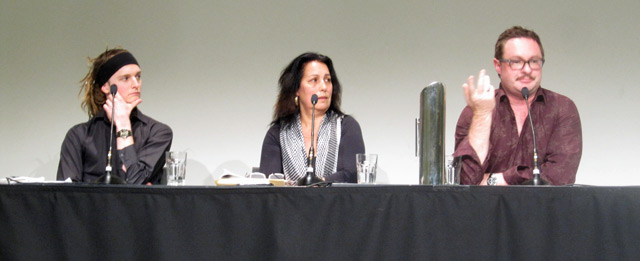Before around 50 journalism students, we each gave a 10 minute presentation and then fielded questions from the audience for the remaining half-hour. I chose to spend my allocated time by giving a brief overview of my path so far, and then speaking about things I’ve learned in the past two years as a freelancer.
The best way to be a freelance journalist is to wake up every day and be a freelance journalist. This means you’ll spend your day researching story ideas, pitching stories to editors, requesting interviews with people you wish to speak to, transcribing interviews, shaping stories until they’re as good as they can be, and then filing them to your editor. I’ve just summed up the entire job in a sentence. That’s what freelance journalism involves. You’ll think of an interesting thing to write about, pitch this interesting thing to an editor, get permission from the editor to write about this interesting thing in exchange for money, and then go out and do just that. Over and over.
In a way, it’s not glamorous at all, but it depends how you look at it. I choose to look at freelance journalism as: getting paid to learn things, and sharing that knowledge with readers. In many cases I know very little about a particular topic when I pitch a story, but through curiosity and initiative in approaching an editor to write about it, I get paid to familiarise myself with an industry, or a culture, or an issue that affects a lot of people. I’m not saying that I become an expert on something after researching it for only a week or two, but I’ll generally know more about it than the average person. And then when the average person reads my story, they too become informed. It’s a beautiful cycle, and it’s a wonderful way to make a living, as long as you have an interest in learning things. If not, freelance journalism probably isn’t for you. But you should still try it anyway, because you never know.
Ideas. You need to have absolute faith and conviction in your ideas, because ideas are your lifeblood as a freelance journalist. Without them, you fail. Without them, you’re nothing to nobody. But to have an idea is not enough: you need to conceptualise an idea in a full enough manner that an editor will read your idea and be willing to part with a few hundred or thousand dollars from their budget in order for you to bring that idea to fruition. When I started freelance journalism, my ideas were terrible. I look back on them now and I’m embarrassed by how lame and elementary they seem in comparison to what I’m pitching now. Like anything though, freelance journalism is a learning experience, and you get better over time. But at the heart of this game is the quality of your ideas, which you need to hone and sharpen and polish on a daily basis if you have any hope of getting anywhere.
Curiosity. Curiosity is currency. As I mentioned earlier, I see this job as being paid to learn, and to teach. Curiosity is key, though, because 95% of my ideas come from reading or watching something and wondering, “why is that?” Or, “how does that work?” Or “why did that person or company make that decision?”. Generally, the question is “why”. The “why” should be a question that you ask yourself constantly. Not out loud, because you’ll probably sound like a lunatic, but as you move through the world, be curious. Story ideas should come easily if you keep listening to the “Why” in the back of your head.
Mentors. This might be the most important thing I’m going to say today. You need to find a mentor. You need to find someone knowledgeable, who believes in you, who you can report to on a weekly basis and whose input you greatly value. I’m not saying it’s impossible to succeed without one, but I’d guess that it would be much harder. I’ve had a mentor for two years and I wouldn’t have achieved anywhere near as much as I have without their help. I don’t quite know how to explain it, or even how it works, but being accountable to someone other than yourself is a massive productivity boost. You need someone who’ll give you a kick up the arse if you have a slack week, or gently pick you up if you’re feeling deflated for whatever reason. This person doesn’t necessarily have to be a writer or a journalist. As long as they understand the freelance lifestyle and have a background in anything creative, they should be a good fit. But you won’t know if they’re a good fit until you try a mentor relationship. So start thinking about mentors, if you’re serious about pursuing freelance journalism.
Always look up. Always keep moving forward. Try to have a couple of projects on the go at any one time. Even if you’ve got a few commissions in hand, always be researching new ideas and thinking of new angles that could work for particular publications. The image I like to think of is Tarzan, swinging from tree to tree, only you’re swinging from idea to idea, and from publication to publication. While you’re a freelancer, you shouldn’t settle, even if you find one or two consistent, well-paying gigs. Always be looking up, for your next opportunity, your next big break. Try not to stand still for too long.
Set goals, but don’t be too hard on yourself. Not every day will bring you closer to your goals. You’ll have days where the thought of pitching and writing stories makes you want to crack your skull open against the wall. This is fine, as long as most days aren’t like that. Try to maintain a generally productive mindset, but pay attention to your mental state. Don’t force yourself to work if your mind is screaming out against the concept. If you do take a break, whether for an hour or a day, try not to feel guilty about it.
Self-motivation. It goes without saying that you have to be self-motivated to have any kind of success in this game. Most of the time, you’ll probably be working alone. If you’ve never worked this way before, it can be a shock to the system. It was for me. It took me over a year to find a rhythm where I could sit at my desk all day and work alone without craving some kind of distraction or human interaction. But I found it, eventually, and it’s a nice place to be. Even if I do mess it up occasionally.
Self-talk. In a similar vein to the last point, self-talk is hugely important in this line of work. You are directly responsible for your income. You can’t just show up at your desk and get paid. You have to research, think, send emails, and maintain relationships with people who might know you only as words on a screen. It is a pretty ludicrous situation to be in, if you really sit down and think about it. So try not to think about it. But you need to believe that you can do this, if you want to have anything resembling a career in freelance journalism. You need to believe in yourself, most days of the week. There isn’t a whole lot of room for self-doubt in this game. I think the best way to avoid self-doubt is to always be busy, so that you don’t have time to doubt yourself.
A to-do list to keep track of your daily tasks is a must. Being a freelancer means you’ll be doing lots of follow-ups with people; chasing invoices, chasing interviews, chasing stories you’ve pitched and never heard back from the editor on. These things are tiny and easy to forget, which is why you need to keep track of them. I use a to-do list called teuxdeux.com, spelt the French way. It’s very simple but clean, and lets you see five days ahead at a time. It also has an iPhone app which allows me to refer to it and cross things off when I’m out of office. There are probably many other sites and apps with the same functions but this one works very well for me.
Set up a blog. This is simple and non-negotiable. Set up a blog to act as your portfolio of published work. It doesn’t have to be flashy, it just has to show your work and be regularly updated. If you can, register yourname.com and set up the blog there. Doing this was one of the best decisions I’ve made as a freelance journalist.
Set boundaries. Since you’re not constricted by a traditional workplace or business hours, it’s quite easy to find yourself working from the moment you wake up, until the moment you go to sleep. I’ve been there. It’s not healthy; it’s how you become burnt-out. It’s important to set boundaries around your workplace as a freelancer, and in this case, your workplace is wherever your PC is. For around nine months I’ve kept Saturday as a ‘PC free day’, where I don’t turn the computer on or do any work-related tasks. I also keep Sunday as a day for catching up on RSS feeds, updating my blog, replying to emails; pretty non-intensive tasks. And Monday to Friday is for work. Structuring your workweek is important. You need to respect boundaries, both for yourself and for those closest to you.
Finally: enjoy yourself. Freelance journalism can be a huge amount of fun if you approach it with the right attitude. It’s a great alternative to the traditional path of cadetships and applying for reporter jobs, and you can start doing it today. With persistence, self-belief and talent, there’s no reason why you can’t make a living from freelance journalism. I highly recommend it.


